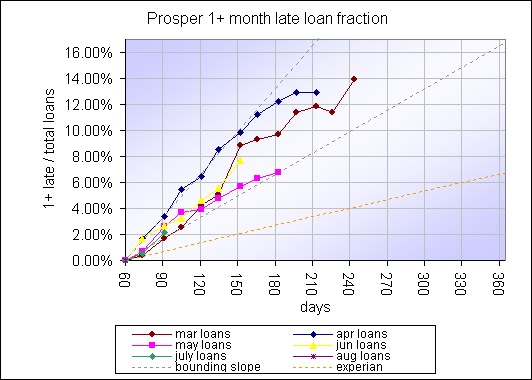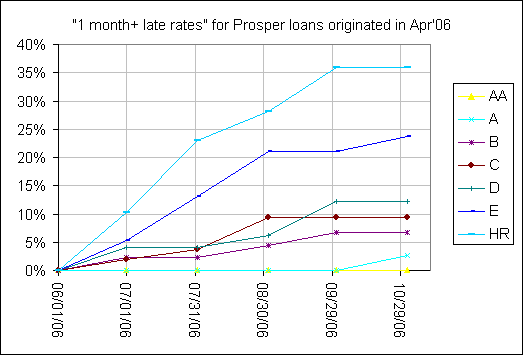Prosper update
I've been doing a lot of thinking about Prosper lately, so I'll post a few of my thoughts.
Prosper, for those of you who haven't followed my previous posts on it, is a person-to-person lending site. Basically people who need money ("borrowers") post requests for loans. People who have money ("lenders") come in an bid an amount of money at an interest rate (per annum). The minimum bid rate is $50, and you can bid any amount above that.
After a few days, the loan listing closes, and the lowest interest rates "win" the bid. The borrower gets the money, and Prosper then handles the payment from the borrowers to the lenders every month. It's really a great way for people to empower one another using micropayments.
So now, the downsides to Prosper:
Putting your money to work takes forever
I wrote about this before, but it takes FOREVER to actually put your money to work. Assuming you've set up a lender account and verified your bank information, it can take up to 5 business days for a deposit to get into Prosper. After that, it may take anywhere to 1-9 business days to get your money in on listings that end (I normally go for loans that close 2-3 days after my deposit gets in, so let's put it at an even 8 business days. After the listing ends, Prosper then verifies the borrower's information (a final scam check, I'm guessing), then creates the loan. I've seen this take anywhere from 2-5 business days.
Basically, for 3 weeks, your money will not be doing any work for you. Once your loan opens, it's a matter of constantly checking back monthly to put your money back to work - the interest/principal payments you receive do not make any interest from Prosper. This is unlike your PayPal "balance," which earns a 5% interest rate.
Deceptive numbers
If you browse the site, you'll run into tons of listings from borrowers classified HR (high risk) loans. These HR loans, obviously, also carry the highest interest rates (potentially up to 29%). Too many new lenders to the site get dollar signs in their eyes and pursue these high risk loans without considering the downside. Prosper clearly states the Experian credit data, which tells you the default rate of these risk types ... but what most people fail to grasp is that Prosper borrowers are higher risk than the Experian values. There are a lot of HR people on Prosper who have been denied by "traditional" loan/credit companies because of the risk of bankruptcy.
How do you gauge success?
All loans on Prosper are fixed at 3-years. This makes understanding the culture and the mathematics behind "successful" loans very difficult. As I stated before, Experian numbers aren't very useful for Prosper, because the borrowers on Prosper are a higher risk group. There have been some great discussions on the Prosper forums about the numbers. One of the posters, pninen posted some interesting graphs:


The first graph shows the number of loans that go late for at least a month. By halfway through the average Prosper life loan, you have 6-12% of your portfolio as possible writeoffs. The second graph shows how each credit risk fares over time - the HRs seem to fail about 1/3 of the time, and this isn't even the whole lifetime of the loan.
One of the coolest things about Prosper is how open they are with their data - a site that uses Prosper's data is called lendingstats.com, which will show you all sorts of information about lenders, including their lending amounts, their performance, their listings, etc. Such transparency is really useful when looking back on loans that went bad.
For example, check out this guy's stats - he loaned upwards of $160K, weighted heavily towards the high risks, and now he's looking at breaking even (if he's lucky). And he's only 1/9 through his loan's lifetimes. Ouch.
Can we find success?
Right now, it seems highly doubtful. My portfolio of loans has been unusually successful - I'm attributing this to luck, and the fact that my loans aren't very mature.
There's a lot of strategies out there for potentially succeeding on Prosper; what's great is with sites like LendingStats, we can see how well these lenders succeed. Some strategies I've thought about potentially succeeding on Prosper:
- Payday loans - The math behind this is pretty self-evident; replace an interest rate in the hundreds to something in the teens will make this a net-benefit for the borrower. The trick is finding people who can still make ends meet if the payday loan is converted
- Credit card consolidation - There are tons of people who juggle huge amounts of credit debt on credit cards effectively. There's a fine line between people who are drowning in debt versus those who are managing it effectively. These people seem to accept paying interest as a way of life; this makes me think that these people are probably the most reliably to lend to, give the risk v. reward (most of these people are in the C-D ranges, which gives an interest rate in the high teens or in the lower twenties)
- A++, A, or B loans - I used to think just loaning to A would be able to lock in a ~8% return (Bert seems to be employing that strategy). The problem is that most of these guys could go get a really cheap loan from the bank, so we have to ask ourselves: Why are they getting a loan at a higher rate with such good credit? The answer: The banks probably denied them, for good reason. I've added a few A and Bs to my loan portfolio, but I'm not sure if this is a winning strategy for Prosper.
I'm really enjoying Prosper though; it's been a great experience thus far, looking at how people budget their money and what people need money for. I never understood why credit card companies charged such high rates ... and I'm beginning to understand why. There are so many people who are irresponsible with money ... I have a newfound respect for banks :)

Comment with Facebook
Want to comment with Tabulas?. Please login.
bert

i think the key strat for a place like prosper is to consider DRPing it back into future loans.
but yeah.. liquidity can not be an issue if you are considering doing any of this.
roy

google says disaster recovery planning, but i'm not sure how that fits in here.
bert

in this case the interest you earn.
roy

bert

but i do know there are a lot of finance guys in a research position that are looking at microlending for research topics.